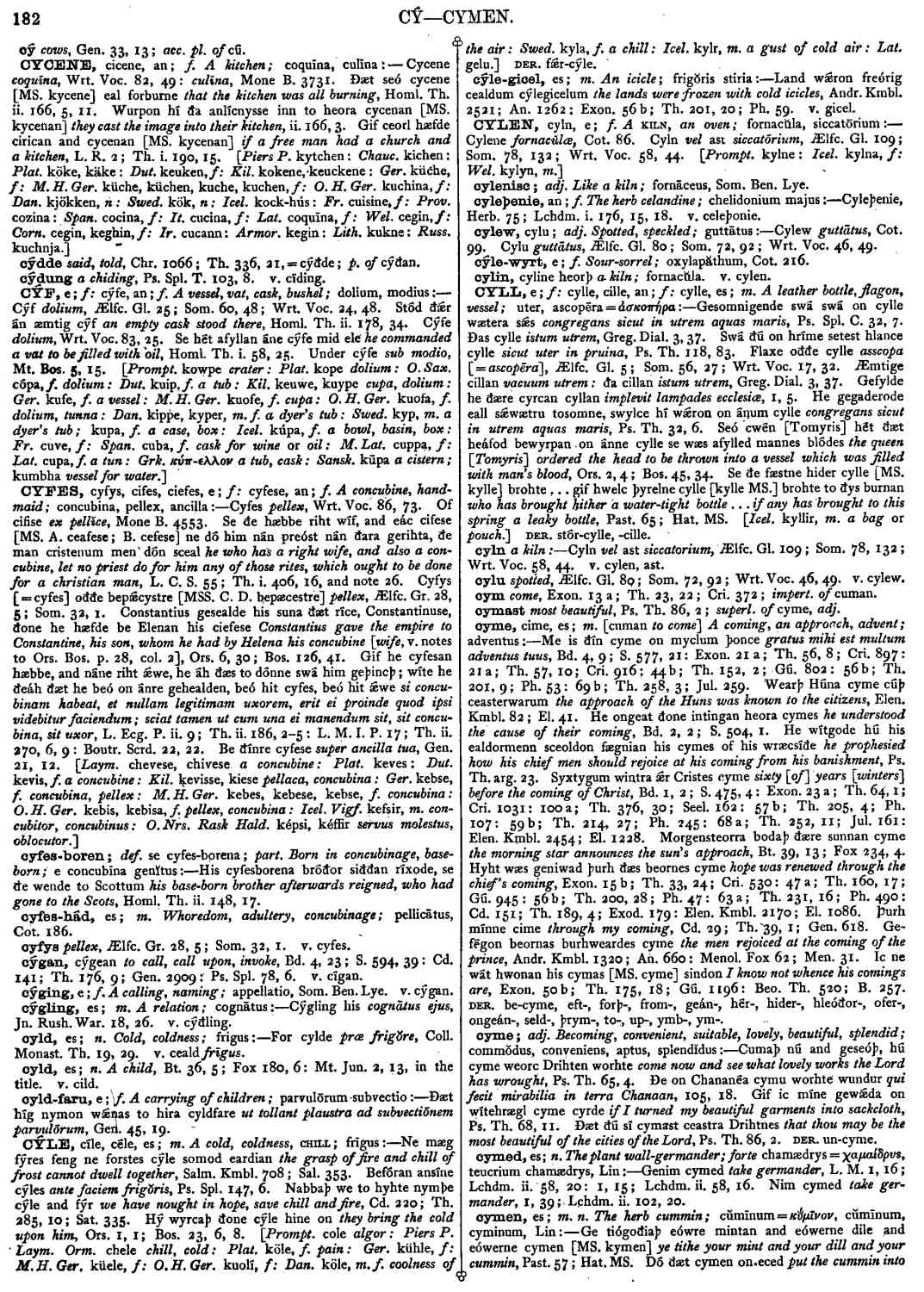cyme
- noun [ masculine ]
-
Me is ðín cyme on myclum þonce
gratus mihi est multum adventus tuus,
- Bd. 4, 9;
- S. 577, 21: Exon. 21a ;
- Th. 56, 8;
- Cri. 897: 21a ;
- Th. 57, 10;
- Cri. 916: 44b ;
- Th. 152, 2;
- Gú. 802: 56b ;
- Th. 201, 9;
- Ph. 53: 69b ;
- Th. 258, 3;
- Jul. 259 .
-
Wearþ Húna cyme cúþ ceasterwarum
the approach of the Huns was known to the citizens,
- Elen. Kmbl. 82 ;
- El. 41 .
-
He ongeat ðone intingan heora cymes
he understood the cause of their coming,
- Bd. 2, 2;
- S. 504, 1 .
-
He wítgode hú his ealdormenn sceoldon fægnian his cymes of his wræcsíðe
he prophesied how his chief men should rejoice at his coming from his banishment,
- Ps. Th. arg. 23 .
-
Syxtygum wintra ǽr Cristes cyme
sixty [of] years [winters] before the coming of Christ,
- Bd. 1, 2;
- S. 475, 4: Exon. 23a ;
- Th. 64, 1;
- Cri. 1031: 100a ;
- Th. 376, 30;
- Seel. 162: 57b ;
- Th. 205, 4;
- Ph. 107: 59b ;
- Th. 214, 27;
- Ph. 245: 68a ;
- Th. 252, 11;
- Jul. 161: Elen. Kmbl. 2454 ;
- El. 1228 .
-
Morgensteorra bodaþ ðære sunnan cyme
the morning star announces the sun's approach,
- Bt. 39, 13;
- Fox 234, 4.
-
Hyht wæs geniwad þurh ðæs beornes cyme
hope was renewed through the chief's coming,
- Exon. 15b ;
- Th. 33, 24;
- Cri. 530: 47a ;
- Th. 160, 17;
- Gú. 945: 56b ;
- Th. 200, 28;
- Ph. 47: 63a ;
- Th. 231, 16;
- Ph. 490: Cd. 151 ;
- Th. 189, 4;
- Exod. 179: Elen. Kmbl. 2170 ;
- El. 1086 .
-
Þurh mínne cime
through my coming,
- Cd. 29 ;
- Th. 39, 1;
- Gen. 618 .
-
Gefégon beornas burhweardes cyme
the men rejoiced at the coming of the prince,
- Andr. Kmbl. 1320 ;
- Ah. 660: Menol. Fox 62 ;
- Men. 31 .
-
Ic ne wát hwonan his cymas [MS. cyme] sindon
I know not whence his comings are,
- Exon. 50b ;
- Th. 175, 18;
- Gú. 1196: Beo. Th. 520 ;
- B. 257 .
Bosworth, Joseph. “cyme.” In An Anglo-Saxon Dictionary Online, edited by Thomas Northcote Toller, Christ Sean, and Ondřej Tichy. Prague: Faculty of Arts, Charles University, 2014. https://bosworthtoller.com/7083.
Checked: 1